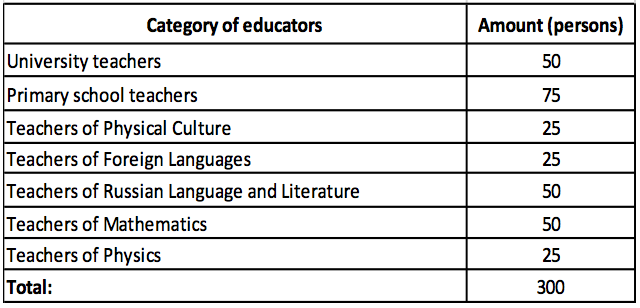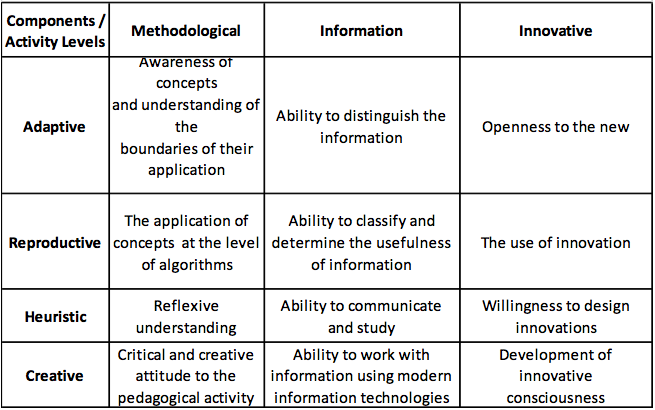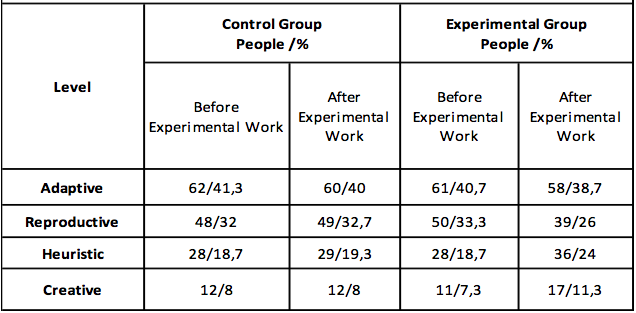

 Vol. 38 (Nº 60) Year 2017. Páge 18
Vol. 38 (Nº 60) Year 2017. Páge 18
Valentina V. GLADKIKH 1; Lyudmila A. OBUKHOVA 2
Received: 06/09/2017 • Approved: 15/09/2017
ABSTRACT: This article is devoted to revealing the problem of formation of the innovative culture of teacher in the system of the professional development. The task of formation of the innovative culture is to create and implement a new form development in the context of the teacher´s professional activity. The article is dealt with the issues related to the development of the information competence, which engender new problems in pedagogical science, presupposing the acquiring the information and communication competences as part of innovative culture of teacher. The authors of the article conclude that the actual characteristic of educator, whose innovative culture is formed, is conscious attitude to the implementation of innovations in the professional practice, development of professional and reflective thinking in the field of pedagogical innovations, availability of extensive knowledge. |
RESUMEN: En este artículo está solucionada la actualidad del problema de la formación de la cultura innovadora del pedagogo en el desarrollo profesional despues de terminar la universidad. Está descrita la creación y aplicación de lo nuevo en el contexto de la actividad profesional del pedagogo. El artículo también aborda cuestiones relacionadas con el desarrollo de la civilización de la información, que da lugar a nuevos retos para la ciencia de enseñanza con la dominancia de la cultura de la información y comunicación como la parte de la cultura innovadora. Los autores concluyen que el pedagogo con la cultura innovadora generada se caracteriza por una actitud consciente para la implementación de innovaciones en la práctica profesional, el desarrollo del pensamiento profesional reflexivo, la presencia de un amplio conocimiento en el campo de innovaciones educativas. |
Numerous researches of the beginning of the 21st century of the scientists (Admiraal W. et al., 2017; Alekseeva L.P., 2002; Antoniali F. et al., 2011; Asensio-Pérez J.I. et al., 2017; Deluca C. et al., 2017; Durksen T.L. et al., 2017; Galustyan O.V., 2015, 2017; Postle K. et al., 2002) is being paid attention to the need of reforming not only the education process, but also the field of improving the qualifications of teachers of educational institutions. To determine the trends of the improving forms and methods of teaching, they consider goals and objectives and the content of advanced training which can be used to improve skills of the teaching staff. However, the content of the training in the system of additional professional teacher’s education often repeats the methods and forms of the process organization of teaching the students at higher institutions. Besides, the educational process in the system of professional development is realized often by the same teachers of the university who have an experience of training the students, but not of the teaching staff (Chen A.K. et al., 2017; Guskey T.R., 2002, 2003; Gladkikh V.V. and Volynkina N.V., 2010; Gorshkova O.O., 2017; Pereira S. et al., 2014; Romanello M., 2017; Van Lankveld T. et al., 2017; Widjaja W. et al., 2017; Zhu C. and Engels N., 2013).
The application of different forms of teaching such as discussions, trainings, round tables, games, cases, etc. did not always lead to the expected results of continuing education. In general, the current state of the professional development process of teachers is often based on an empirical approach, or, as already mentioned above, on copying the forms and methods of teaching the students. All this specific sets of tasks for the organization of professional development should be characterized by using innovative forms and methods; personal and professional characteristics of the listeners should be considered, which are not only of a great importance but also have many difficulties of a subjective and objective nature.
The analysis of pedagogical practices shows, that there are the difficulties in formation of the innovative culture of teacher, namely, combination of theoretical positions with empirical experience; one-sided orientation on the logical component of thinking and on the knowledge reproductive assimilation, skills and habits; stereotypical or accidental forms and methods of working which come into the conflict between the requirements of the new content of pedagogical work and its quality (Aydogan Yenmez A. et al., 2017; Christensen R. and Knezek G., 2017; Louws M.L. et al., 2017; Mansfield C. and Thompson G., 2017; O’Leary M. and Wood P., 2017; Tavakoli M. and Baniasad-Azad S., 2017; Trust T. et al., 2017; Zaytsev K. and Sergievskiy M., 2017). Working out methodological approaches to the formation of the innovative culture of teacher we should consider the innovative achievements of pedagogy and psychology, which have been generated by the needs of a new stage in the development of education. It envisages mastering new general theoretical and technological knowledge, expanding the range of skills and knowledge, deepening the understanding of the connection between science and practice. One of the forms of mastering the best innovative pedagogical experience is advanced training of the teaching staff in system of vocational training and retraining, which aimed on improving professional work, establishing a conformity between the level of the teacher's readiness for the implementation tasks of upbringing, education and development and the level of modern pedagogical work, which form the basis of pedagogical activity (Admiraal W. et al., 2017; Alekseeva L.P., 2002; Asensio-Pérez J.I. et al., 2017; Deluca C. et al., 2017; Durksen T.L. et al., 2017; Postle K. et al., 2002). The training and retraining of high school teachers as subjects of innovation is becoming one of the urgent problems in our rapidly developing world. This is due to the fact, that modern higher education in Russia is in a stage of dynamic renewal and the teacher´s innovative activity in higher professional education is a necessary, prerequisite for the development of his/her creative abilities, an integral component of his/her life activity and an indispensable condition for improving pedagogical experience based on the growth of pedagogical qualifications and professional skills.
The highly qualified, creative-minded, socially active and competitive educator with an innovative culture is the most demanded nowadays (Gladkikh V.V. and Volynkina N.V., 2010; Sternberg, R., 2006). An educator should obtain willingness and ability to support and implement innovations in all areas of pedagogical activity.
The experimental work on the formation of the teacher's innovative culture was carried out in the Voronezh Institute for Educational Development (Voronezh, Russian Federation). The purpose of the experimental work was to determine the attitude of teachers towards innovations at the initial and final stages of professional development. 300 teachers of Voronezh universities and schools were involved. We formed a control group and an experimental group from the teaching staff teaching different subjects (university teachers, primary school teachers, teachers of physical culture, teachers of foreign languages, teachers of Russian language and literature, teachers of mathematics, teachers of physics). 150 teachers represented an experimental group and 150 teachers were assigned in a control group. Amount and category of educators are presented in Table 1.
Table 1
Category of educators

The total period of training of both control and experimental groups was four months.
We followed the conditions in the formation of a control group and an experimental group:
The experiment was conducted in several stages. At the first stage, a survey was conducted. We developed a questionnaire to determine the teacher’s attitude to innovations, which consisted of 20 questions. Teachers needed to give a full, detailed response with explanations of their point of view.
The results of the questionnaire showed, that 56% (84 people) of the control group of teachers and 52% (78 people) of the teachers of the experimental group out of the total number of the questioned listeners showed a situational interest in the innovative culture of the teacher, that made the study relevant.
The implementation of innovative activities of teachers within the course of the pilot study was based on scientific and methodological support, including the possibility of studying innovative pedagogical experience, participation of teachers in professional educational projects, conferences of various levels, meetings of methodical associations, methodological seminars, workshops; attendance of classes for obtaining computer skills; implementation of practically oriented tasks of a creative nature, etc. The components and levels for evaluation of formation of the innovative culture of teacher in control and experimental groups are presented in Table 2.
Table 2
Parameters for evaluation of formation of the innovative
culture of teacher in control and experimental groups

Obtained innovative knowledge and skills gained within the advanced training of teachers were realized in the educational projects. Teachers were offered to develop individual educational projects using various information materials, scientific, methodological and reference literature, etc. The structure of the projects consisted of the project name, a brief rationale for selecting the project problem, ways to solve the problem of this project, the results of this project, the project participants, the means or resources for implementing the project, the plan of the project. The criteria of evaluation the projects were congruency with the basic parameters (Table 2), the plan and the time available for the presentation; the way of presentation. The evaluation of formation of the innovative culture of teacher in control and experimental groups before and after experimental work is presented in Table 3.
We performed statistical processing of the obtained data comparing the results of the control and experimental groups at the initial and final stages of the experiment within these groups which are represented in Table 3.
Table 3
The dynamics of formation of the innovative culture
of teacher in control and experimental groups

Analyzing the results of the experimental work in control and experimental groups, one can see that most of the teachers show almost identical level of innovative culture formation (41.3% in the control group and 40% in the experimental group) at the initial stage. The same creative level of innovation activity (12.8%) is possessed by the teachers of both control group and experimental group. The results of experimental group showed a higher creative level (11.3% of the teachers after experimental work, compared with 7.3% at the initial stage of the experiment). Compared with the initial stage (18.7%) heuristic level had 24%. At the final stage of the experiment data indicate a decrease in adaptive (40.7% - 38.7%) and reproductive (33.3% - 26%) levels in the experimental groups and increase the ability of the listeners to manage themselves, clearly understand their personal and professional values, clearly represent the goals of innovation, understand the characteristics of the chosen profession.
The administration of the educational institution stimulated and supported the teachers in creation and implementation pedagogical innovations, provided them with the material and technical base which was necessary for introducing innovations into the educational process, carried out the theoretical training of teachers through mastering their innovative knowledge within lectures and practical classes.
During the experimental work, active teaching methods were used:
The main peculiarity of conducting classes devoted to the formation of the teacher's innovative culture was the theoretical and practical combination. The combination of theoretical training with practical exercises, formation of computer skills contributed to the formation of motivation for teachers to use innovative educational technologies.
Since formation of the teacher's innovative culture is an ongoing process of developing set of motives, knowledge and skills, the process itself can be effective only while ensuring the mental and behavioral activity of teachers. It is necessary to make changes in the system of vocational training and retraining.
Further development of the diagnostic component is of scientific, theoretical and practical interest. It provides the process of formation of the teacher's innovative culture and professional development as a resource for the development of the modern system of education. In our opinion, monitoring is an important indicator of the qualitative construction of work in the context of the innovative activity of the educational institutions, which allow to determine the teacher's innovative potential, concretizing and directing his/her creativity, helping to form educational environment during the innovative process.
Summarizing it is necessary to emphasize that the teacher with the formed innovative culture is characterized by the conscious attitude to realization of innovations in professional practice, which contributes to the professional growth and competitiveness of specialist in the labor market.
ADMIRAAL W., LOUWS M., LOCKHORST D., PAAS T., BUYNSTERS M., CVIKO A., JANSSEN C., DE JONGE M., NOUWENS S., POST L., VAN DER VEN F., KESTER L. (2017). Teachers in School-Based Technology Innovations: A Typology of Their Beliefs on Teaching and Technology. Computers and Education, 114, 57-68. DOI: 10.1016/j.compedu.2017.06.013
ALEKSEEVA L.P. (2002). Upgrading the Qualifications of Teachers of Russian Universities in the Conditions of Reforming the Higher School. NIIVO, 48.
ANTONIALI F., ANTONIALI L.M., dos SANTOS A.M. (2011). 3, Analysis of Govermance Structures in Public and Private Higher Education Institutions as a Way of Subsidizing the Strategic Planning Development, 2. Retrieved from http://revistaespacios.com/a17v38n06/17380602.html
ASENSIO-PÉREZ J.I., DIMITRIADIS Y., POZZI F., HERNÁNDEZ-LEO D., PRIETO L.P., PERSICO D., VILLAGRÁ-SOBRINO S.L. (2017). Towards Teaching as Design: Exploring the Interplay Between Full-Lifecycle Learning Design Tooling and Teacher Professional Development. Computers and Education, 114, 92-116. DOI: 10.1016/j.compedu.2017.06.011
AYDOGAN YENMEZ A., ERBAS A.K., CAKIROGLU E., ALACACI C., CETINKAYA B. (2017). Developing Teachers' Models for Assessing Students' Competence in Mathematical Modelling Through Lesson Study. International Journal of Mathematical Education in Science and Technology, 48 (6), 895-912. DOI: 10.1080/0020739X.2017.1298854
CHEN A.K., DENNEHY C., FITZSIMMONS A., HYDE S., LEE, K., RIVERA J., SHUNK R., WAMSLEY, M. (2017). Teaching Interprofessional Collaborative Care Skills Using a Blended Learning Approach. Journal of Interprofessional Education and Practice, 8, 86-90. DOI: 10.1016/j.xjep.2017.07.002
CHRISTENSEN R., KNEZEK G. (2017). Readiness for Integrating Mobile Learning in the Classroom: Challenges, Preferences and Possibilities. Computers in Human Behavior, 76, 112-121. DOI: 10.1016/j.chb.2017.07.014
DELUCA C., BOLDEN B., CHAN J. (2017). Systemic Professional Learning Through Collaborative Inquiry: Examining Teachers' Perspectives. Teaching and Teacher Education, 67, 67-78. DOI: 10.1016/j.tate.2017.05.014
DURKSEN T.L., KLASSEN R.M., DANIELS L.M. (2017). Motivation and Collaboration: The Keys to a Developmental Framework for Teachers’ Professional Learning. Teaching and Teacher Education, 67, 53-66. DOI: 10.1016/j.tate.2017.05.011
GALUSTYAN O.V. (2015). Digital Campus as Electronic Image of the University. Rupkatha Journal on Interdisciplinary Studies in Humanities, 7(3), 263-270. Retrieved from http://rupkatha.com/V7/n3/28_digital-campus.pdf
GALUSTYAN O.V. (2017). Some Methodological Aspects of the Evaluation of Students’ Educational Achievements at University. (IJCRSEE) International Journal of Cognitive Research in Science, Engineering and Education, 5(1), 43-48. Retrieved from http://www.ijcrsee.com/index.php/IJCRSEE/article/view/7/9
GLADKIKH V.V., VOLYNKINA N.V. (2010). Organization of Intellectual and Creative Activity of Students in the Conditions of the Multicultural Information Educational Environment of the Military High School. Voronezh, 216.
GORSHKOVA O.O. (2017). Network Educational Resources in the Research Student Training, 38, p. 11. Retrieved from http://revistaespacios.com/a17v38n25/17382511.html
GUSKEY T.R. (2002) Professional Development and Teacher Change. Teachers and Teaching, 8(3), 381-391.Retrieved-from http://www.tandfonline.com/doi/abs/10.1080/135406002100000512?journalCode=ctat20
GUSKEY T.R. (2003) What Makes Professional Development Effective? Phi Delta Kappan, 84(10), 748-750.-Retrieved-from http://journals.sagepub.com/doi/abs/10.1177/003172170308401007?journalCode=pdka
LOUWS M.L., MEIRINK J.A., VAN VEEN K., VAN DRIEL J.H. (2017). Teachers' Self-Directed Learning and Teaching Experience: What, How, and Why Teachers Want to Learn. Teaching and Teacher Education, 66, 171-183. DOI: 10.1016/j.tate.2017.04.004
MANSFIELD C., THOMPSON G. (2017). The Value of Collaborative Rounds for Teacher Professional Learning in Australia. Professional Development in Education, 43 (4), 666-684. DOI: 10.1080/19415257.2016.1216883
O’LEARY M., WOOD P. (2017). Performance Over Professional Learning and The Complexity Puzzle: Lesson Observation in England’s Further Education Sector. Professional Development in Education, 43 (4), 573-591. DOI: 10.1080/19415257.2016.1210665
PEREIRA S., FALCAO VIERA E.M., MOREAS M., HERMENEGILDO J., ROSSATO J. (2014) Creative Process for Learning in Distance Education; An Attitudinal Self-Evaluation, 35, 2. Retrieved from http://revistaespacios.com/a14v35n04/14350402.html
POSTLE K., EDVARDS C., MOON R., RUMSEY H., and THOMA, T. (2002) Continuing Professional Development After Qualification-Partnerships, Pitfalls and Potential, 21, 2. Retrieved from http://www.tandfonline.com/doi/abs/10.1080/02615470220126408
ROMANELLO M. (2017). The Private and Social Return to Education Considering the Characteristics of Society, 38, 13. Retrieved from http://revistaespacios.com/a17v38n15/17381513.html
STERNBERG, R. (2006). The Nature of Creativity. Сreativity Research Journal, 18(1), 87-98. Retrieved_from_http://people.uncw.edu/caropresoe/GiftedFoundations/SocialEmotional/Creativity-articles/Sternberg_Nature-of-creativity.pdf
TAVAKOLI M., BANIASAD-AZAD S. (2017). Teachers’ Conceptions of Effective Teaching and their Teaching Practices: a Mixed-Method Approach. Teachers and Teaching: Theory and Practice, 23 (6), 674-688. DOI: 10.1080/13540602.2016.1218326
TRUST T., CARPENTER J.P., KRUTKA D.G. (2017). Moving Beyond Silos: Professional Learning Networks in Higher Education. Internet and Higher Education, 35, 1-11. DOI: 10.1016/j.iheduc.2017.06.001
Van LANKVELD T., SCHOONENBOOM J., CROISET G., VOLMAN M., BEISHUIZEN J. (2017). The Role of Teaching Courses and Teacher Communities in Strengthening the Identity and Agency of Teachers at University Medical Centres. Teaching and Teacher Education, 67, 399-409. DOI: 10.1016/j.tate.2017.07.011
WIDJAJA W., VALE C., GROVES S., DOIG B. (2017). Teachers’ Professional Growth Through Engagement with Lesson Study. Journal of Mathematics Teacher Education, 20 (4), 357-383. DOI: 10.1007/s10857-015-9341-8
ZAYTSEV K., SERGIEVSKIY M. (2017). Globalization of Higher Education Based on Military and Economic Alliances, p. 19. Retrieved from http://revistaespacios.com/a17v38n25/17382519.html
ZHU C., ENGELS N. (2013) Organizational Culture and Institutional Innovations in Higher Education,-2(4).-Retrieved-from http://journals.sagepub.com/doi/abs/10.1177/1741143213499253?journalCode=emad
1. The Military Educational and Scientific Center of the Air Force "The Air Force Academy named after Zhukovsky N.E. and Gagarin Y.A.", Voronezh, Russia. E-Mail: valentina.v.gladkikh@gmail.com
2. Voronezh Institute for Educational Development, Voronezh, Russia.